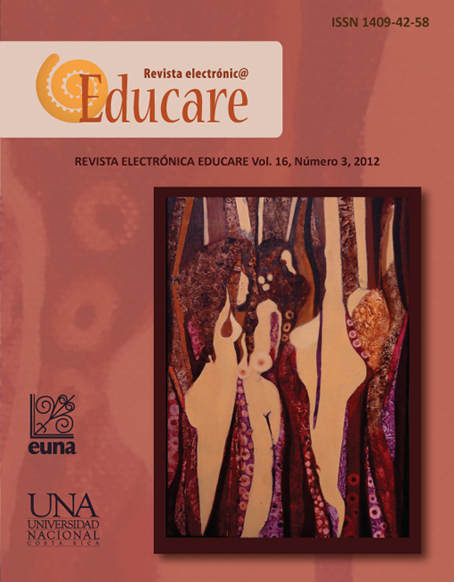Teacher’s Role in the Promotion of Two Emotional Intelligence Competencies in Fifth-Grade Children
DOI:
https://doi.org/10.15359/ree.16-3.3Keywords:
Emotional intelligence, awareness of self-emotions, emotional management, emotional literacy, teacher, emotional education.Abstract
This paper presents the results of a qualitative study aimed at analyzing the teacher’s role in promoting awareness and management of emotions in fifth-graders, as competencies of emotional intelligence. This resulted in a very significant study since, from the psychopedagogic perspective, it aims at breaking with the traditional role of teachers exclusively focused on transmitting knowledge, leaving aside the much-needed emotional support. Children demonstrated a poor vocabulary, as well as difficulty to identify some emotions and differentiate between them. This means a limitation for children to be aware of their own emotions and to control them. As a conclusion, it is important to maximize the emotional capacities of students; it should be a primary task in the education centers, where teachers play a key role as a model and as a promoter of emotional intelligence.
References
Álvarez, M. (Coord.). (2001). Diseño y evaluación de programas de educación emocional (2ª ed.).
España: Praxis.
Begoña, I. (2003). Dirigir y educar con inteligencia emocional. smProfes.net. Recuperado de
http://www.profes.net/rep_documentos/Noticias/IntelEmoc.pdf
Bisquerra, R. (2001). Educación emocional y bienestar. España: Praxis.
Bisquerra, R. (2002). La competencia emocional. En M. Álvarez y R. Bisquerra (Coords.), Manual
de orientación y tutoría (pp. 144/69-144/83). España: Praxis.
Casas, G. (2001). La inteligencia emocional. (Conferencia). Recuperado de www.binasss.sa.cr/
bibliotecas/bhp/inteligencia1.doc
Colom, R. B. (1998). Capacidades humanas. España: Pirámide.
Cortese, A. (s. f). Competencias emocionales. Recuperado dehttp://www.inteligencia-emocional.
org/articulos/competenciasemocionales.htm
Goleman, D. (1995). Inteligencia emocional. México: Javier Vergara Editor.
López, K., Traña, M. y Araya, S. (2005). Fortaleciendo mis emociones positivas y potenciando mi
desarrollo humano: Una propuesta metodológica desde el trabajo social con adolescentes
de educación secundaria (el caso de los/las estudiantes de octavo año del Colegio Gregorio
Ramírez de Alajuela). (Tesis de licenciatura). Escuela de Trabajo Social. Sede del Occidente,
Universidad de Costa Rica. San José Costa Rica.
López, M. E. y González, M. F. (2005). Inteligencia emocional. (Tomo I, 6ª reimpresión). Colombia:
Gamma.
Núñez, M. (2005). El crecimiento emocional social en psicopedagogía. Caracas: Torino.
Portugá, S. y Cruz, E. (1999). Inteligencia emocional. México: Universidad Virtual del Sistema
Tecnológico Monterrey.
Rizo, W. (1997). De regreso a casa. Colombia: Norma.
Rodríguez, G., Gil, J. y García, E. (1996). Metodología de la investigación cualitativa (2ª ed.).
España: ALJIBE.
Taylor, S. J. y Bodgan, R. (1992). Introducción a los métodos cualitativos de investigación.
Argentina: Paidós.
Zabala, A. y Arnau, L. (2007) 11 ideas clave. Cómo aprender y enseñar competencias. Barcelona: Graó.
Downloads
Published
How to Cite
Issue
Section
License
1. In case the submitted paper is accepted for publication, the author(s) FREELY, COSTLESS, EXCLUSIVELY AND FOR AN INDEFINITE TERM transfer copyrights and patrimonial rights to Universidad Nacional (UNA, Costa Rica). For more details check the Originality Statement and Copyright Transfer Agreement
2. REUTILIZATION RIGHTS: UNA authorizes authors to use, for any purpose (among them selfarchiving or autoarchiving) and to publish in the Internet in any electronic site, the paper´'s final version, both approved and published (post print), as long as it is done with a non commercial purpose, does not generate derivates without previous consentment and recognizes both publisher's name and authorship.
3. The submission and possible publication of the paper in the Educare Electronic Journal is ruled by the Journal’s editorial policies, the institutional rules of Universidad Nacional and the laws of the Republic of Costa Rica. Additionally, any possible difference of opinion or future dispute shall be settled in accordance with the mechanisms of Alternative Dispute Resolution and the Costa Rican Jurisdiction.
4. In all cases, it is understood that the opinions issued are those of the authors and do not necessarily reflect the position and opinion of Educare, CIDE or Universidad Nacional, Costa Rica. It is also understood that, in the exercise of academic freedom, the authors have carried out a rogorous scientific-academic process of research, reflection and argumentation thar lays within the thematic scope of interest of the Journal.
5. The papers published by Educare Electronic Journal use a Creative Commons License:














 The articles published by Educare Electronic Journal can be shared with a Creative Commons License:
The articles published by Educare Electronic Journal can be shared with a Creative Commons License: 



